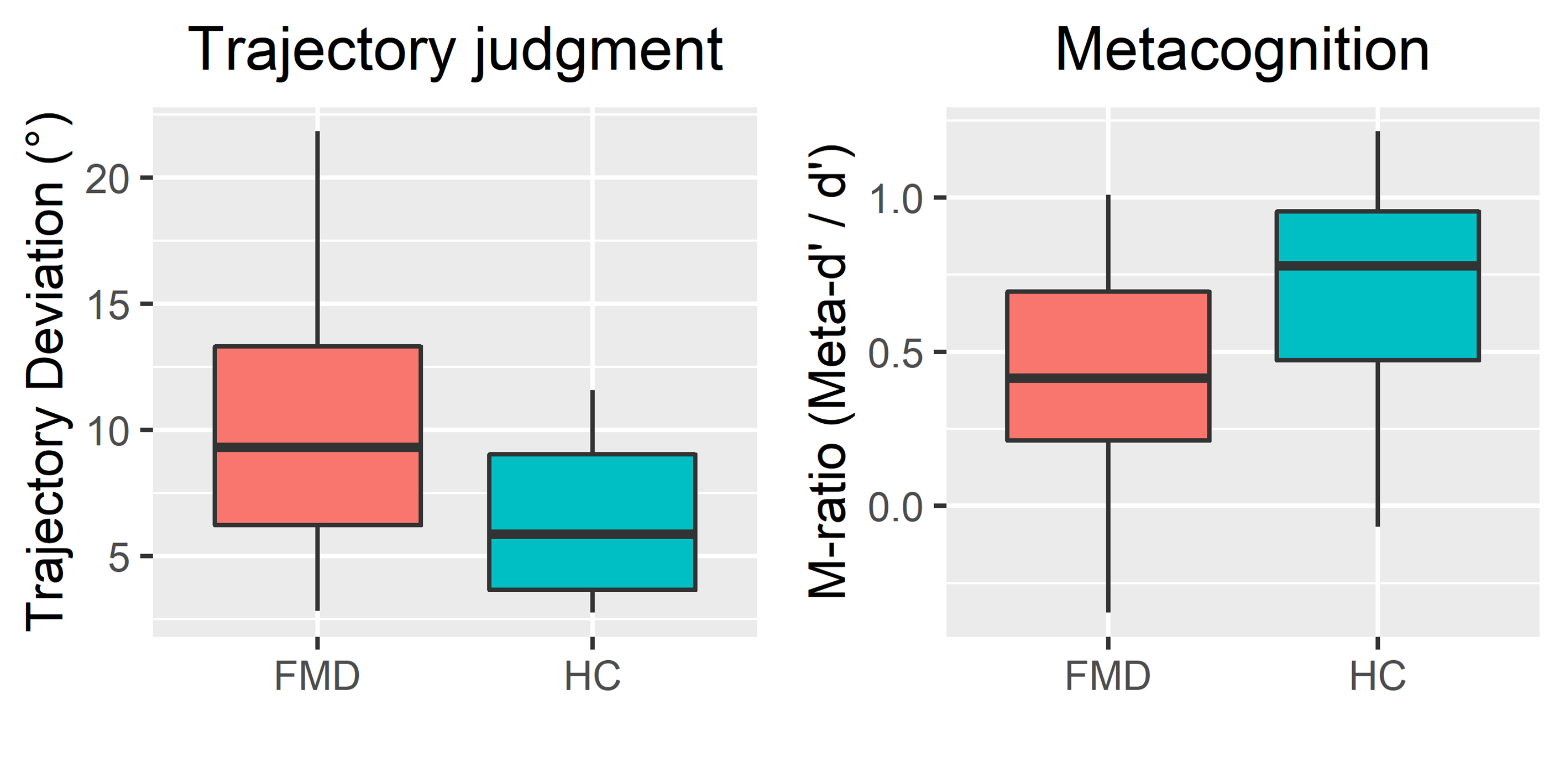Objective: To characterize potential deficits in metacognition of voluntary movements in functional movement disorders (FMD).
Background: Pathological movements in FMD exhibit behavioral and neurophysiological signatures of voluntary actions and, conversely, signatures of voluntary actions are reduced in FMD [1,2]. This suggests altered action awareness, including reduced metacognition of action, plays a role in the pathophysiology of FMD.
Method: Twenty-four participants with a diagnosed FMD (15 female, 16-68 years) and twenty-four age- and sex-matched healthy controls (HC) were included in the present study. Motor symptoms in patients included functional gait disturbances (n=16), functional tremor (n=9), and functional tic-like movements (n=5).
[figure1]
Participants performed goal-directed movements on a graphics tablet, controlling a cursor on a computer screen. Then, participants indicated which of two trajectories presented on the screen was closer to their preceding movement. The angular deviation between trajectories was continuously adapted, targeting an accuracy level of 70%. Finally, participants rated their confidence in the trajectory judgment. Metacognitive performance was assessed using established measures relating confidence ratings to accuracy of the trajectory judgment, including the M-ratio (meta-d’/d’) that controls for accuracy differences in the trajectory judgment.[3]
Results: FMD patients and HC showed comparable movement speed and accuracy, trajectory judgment accuracy, and use of the confidence scale. However, in FMD patients a significantly greater distance between trajectories was required to reach the 70% accuracy level, indicating a reduced sensitivity in judging their own movements. Moreover, FMD patients showed reduced metacognitive performance according to the M-ratio as well as other measures of metacognitive sensitivity. Control analyses confirmed these effects were not due to outliers, group differences in IQ, or task performance in the motor- and trajectory-task.
[figure2]
Conclusion: Relative to HC, FMD patients exhibited deficits both in judging their own movements and in the metacognitive evaluation of these judgments. Reduced metacognitive access to voluntary movements may play a role in the pathophysiology of FMD and lay the ground for new treatment strategies such as metacognitive behavioral therapy.
References: 1 Stenner, M.-P. and Haggard, P. (2016) Voluntary or involuntary? A neurophysiologic approach to functional movement disorders. In Handbook of Clinical Neurology 139, 121-129
2 Pareés, I. et al. (2014) Loss of sensory attenuation in patients with functional (psychogenic) movement disorders. Brain 137, 2916–2921
3 Fleming, S.M. and Lau, H.C. (2014) How to measure metacognition. Front. Hum. Neurosci. 8, 443
To cite this abstract in AMA style:
F. Chwolka, J. Verrel, J. Moyé, S. Zittel, E. Filevich, T. Paulus, T. Bäumer, A. Münchau, A. Weissbach. Reduced metacognition of voluntary movements in functional movement disorders [abstract]. Mov Disord. 2022; 37 (suppl 2). https://www.mdsabstracts.org/abstract/reduced-metacognition-of-voluntary-movements-in-functional-movement-disorders/. Accessed January 21, 2026.« Back to 2022 International Congress
MDS Abstracts - https://www.mdsabstracts.org/abstract/reduced-metacognition-of-voluntary-movements-in-functional-movement-disorders/


